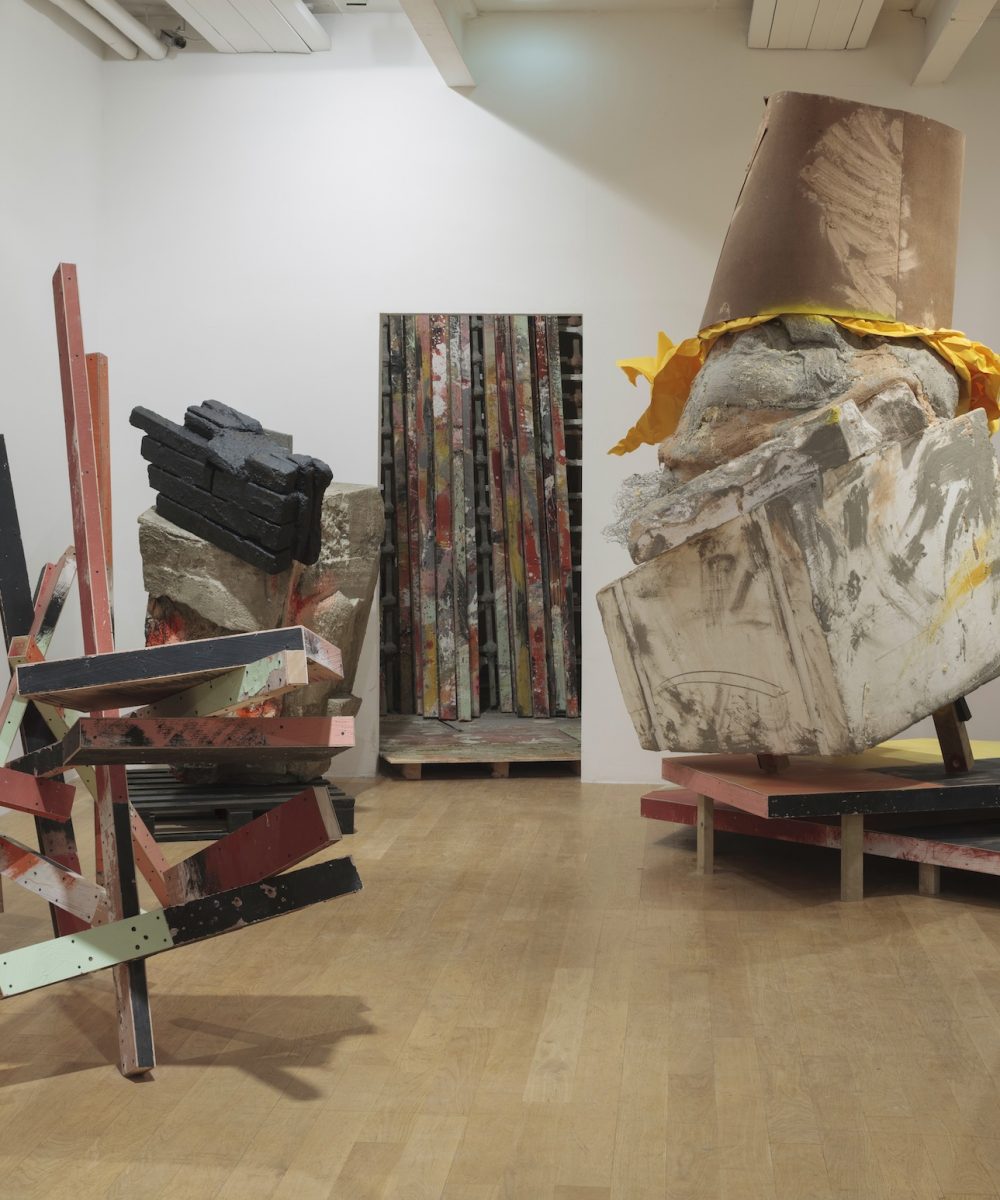Phyllida Barlow, set, Fruitmarket Gallery, Edinburgh, 27 June – 18 October 2015
Phyllida Barlow: set
left to right: untitled: caro, 2015, timber, plywood, filler, paint, 360 x 480 x 270 cm;
untitled: block, 2015, timber, polystyrene, cement, paint, PVA, steel, wire mesh, 190 x 140 x 210 cm;
untitled: postsgridspallets, 2015, timber, paint, cement, scrim, plaster, sand, 360 x 430 x 650 cm;
untitled: dunce, 2015, timber, polystyrene, paint, paper, wire mesh, cement, plaster, scrim, polyurethane foam, plywood, 310 x 290 x 320 cm.
Installation view: set, The Fruitmarket Gallery, Edinburgh, 2015
Courtesy the artist and Hauser & Wirth
Photo: Ruth Clark
Blackened painted-out surveillance cameras in dangling clumps like coal clouds meet the visitor in the opening passages of ‘set’, London-based Newcastle born Phyllida Barlow’s current Fruitmarket Gallery exhibition. These objects, spaced across the gallery’s frontage, book shop and café signal a new world inside. One which seeks to the ‘turn the gallery – and our experience of it – upside down.’
The Gallery’s unique architectural stacking, one gallery sitting on top of another, is a central concern to Barlow’s project here as is an audience’s self-awareness, their seeing and conflicting experiences in spaces brought together as a workshop, studio, exhibition and dramatically changing personality. Wooden painted platforms and backdrops hold objects with spattered grey clay and concrete. Plywood surfaces are painted in powdery washes of pink, orange and yellow with dashes of fluorescent aerosol spray. Outside becomes inside as marks more commonly found on asphalt for road works that signify repaired cables, potholes and gas lines are recruited into her aesthetic. Vibrantly incompatible they evidence functions and operations, surfaces and cladding hiding dirty internal mechanisms.
Her sculptures coalesce in material form performative actions: prop and propped, balancing and collapsing, folded for unfolding, solid for dropping. She makes them announce their material qualities: porous, smooth, textured, brittle and mottled. Their densities: floating, compressed, heavy or light weight. She propels the exhibition through shifts in scale from monumental heights to invisible particles. This exhibition has airborne detritus that can be felt in your lungs.
Some of the work in the lower gallery has the qualities of an earthquake or natural disaster, a sensibility seen in some of the violent and invasive work of the German artist Felix Schramm. While questions – which draw parallels to the exhibition the Unmonumental at the New Museum in New York – on the subjects of material abrasion, control and anarchy brings to mind the work of Isa Genzken and Rachel Harrison. While her investigations of immersive experiences on an industrial scale reminds us of the late US artist Jason Rhoades, the focus of a recent retrospective seen at BALTIC in Gateshead.
The first floor gallery becomes quarantined by a room-sized obstacle. The audience is shunted to its sidelines left to navigate the gallery around a narrow walkway, overwhelmed by this mutant shelter/barricade/ disguised form. Its internal spaces, made of haphazard constructed bolsters and panels, are only viewable at a specific angle. While three objects like trees shorn of their branches rest on the gallery walls. They seem to have escaped from the room’s sculpture-as-enclosure. The first floor object, which, despite its massive scale, is an apprehensive work. She describes it as ‘silencing the space’. A contrast to the downstairs effervescent – and unapologetically confident – theatricality.
She moves her objects into and out of abstraction, a part of a sport stadium bleacher and domestic clothing drying horses appear but are quickly consumed back into what she describes as the ‘drama of objects’, into the ‘settlement and the satisfaction of idle arrangements’. She discusses her practice in the same terms as her description of an illegal dump close to her London studio. Where ‘the contents of entire flats’ can often be found deposited.
The work on show is undisciplined, by that I mean not ‘disciplined’ by controlling terminology that sets artists apart according to age, gender, money and status, annotations on career trajectory or importance. Liberated from that it takes risks in its display and ambitions. It is reckless and restless, an extension of Barlow’s mind and the enquiries she has made into sculpture, its properties and potential drawn from over five decades of practice.
With additional thanks to Susan Gladwin and Louise Warmington at Fruitmarket Gallery
